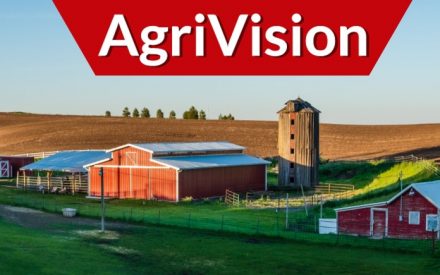Host Katie Wantoch and Jim Versweyveld, Agriculture Extension educator in Walworth County, discuss a female farmer who needs to have a conversation with her dad about her future and their family farm.
View Transcript
This is UW Extension’s Farm Management AgriVision Podcast. I am Katie Wantoch Agriculture agent with the UW-Madison Division of Extension. I’ll be chatting with fellow Extension educators as we answer questions from farmers and share our knowledge and expertise on how you can improve your farm management skills. Today I am joined by Jim Versweyveld, Agriculture Extension educator in Walworth County. Welcome Jim to the podcast.
Jim Versweyveld
Thank you for having me, Katie.
Katie Wantoch
Jim, the question today is from a farmer who currently works about 75 hours per week on a 125 cow dairy farm, as well as their family farm. The family farm has 55 head of beef cattle, with 90 acres owned, an additional 25 acres rented in Central Wisconsin. Her brother and dad help with the beef, however dad is in his 70s and her brother isn’t very interested in being a partner. Dad insists on her brother being a part of the farm because he doesn’t think she can run the show by herself. The income from the family farm is divided three ways. Her boss at the dairy farm might have found part time help so she could be home more in the future. She has been trying to make the farm a one-man operation as much as possible to reduce unnecessary costs and convince dad that her brother would be more of a hassle than a partner. The land and cows are owned by her dad. But she has been buying bulls the last six years to breed them. And she owns 1/3 of the machinery. She’s not sure whether to stay at home on the family farm and accept her brother as a partner, or find a nearby farm to rent and step away until her dad is ready to sell the farm without her brother being a part of it. Jim, what are your thoughts?
Jim Versweyveld
First off, it may be helpful to step back from the family dynamics for a moment. And think about the business plan for this farm. For a partnership to be truly successful, it needs to start with a clear vision, mutual respect, and defined goals. It really helps to sit down and define the roles that each partner will play in managing the farm. And it sounds like from what you’ve described, that discussion hasn’t taken place on this farm. I also think it’s important for this individual to have a thorough discussion with her father. Sometimes assumptions are made, particularly with family members. And it’s important to get those thoughts and feelings out on the table. I think it’s important to get at the perception that dad has that his daughter can’t run the farm on her own. These discussions can be difficult and challenging for everyone involved. But they really are critical before moving forward.
Katie Wantoch
Jim, do you have any suggestions on how she can approach her father to have those conversations?
Jim Versweyveld
I think it’s important to carve out a time when you’re not busy with other tasks or farm chores. So it may be, even though this sounds kind of strange for family members, it may be valuable to schedule an appointment, and really position it as a business meeting and a chance to really talk things through. Because farms are busy places as we know. And if you don’t carve out a specific time for something like this, it may be difficult to have that happen.
Katie Wantoch
Yeah. And it sounds like this young lady certainly is busy. And she talks about working on two different farms and the other projects. Do you have any other suggestions and steps for her?
Jim Versweyveld
Yeah, I totally agree. It sounds like she’s very busy. And I realized that there’s only so many hours in a week. But ideally, operational meetings should be happening at least weekly to discuss projects and tasks that need attention on the farm. These operational meetings are typically very task oriented and plan for the short term. And then the next step would be sure to plan for the longer term for the farm. For the long term, I would encourage this individual to have a strategic planning meeting with her dad and her brother to discuss the goals that they have for the farm operation over the next year. This would be a great time for dad to share his views about farm succession and the long term plans for the farm. It would also be, ideally, important for the brother to share his thoughts about the future of the farm, his level of commitment and his desire to be part of that future. Katie, at the end of the day, it’s possible that this family will be unable to come to a mutually acceptable agreement that meets the needs of this individual and her dad and her brother. But it’s important to know that sooner than later, instead of continuing down a path that could foster disappointment, resentment and ultimately failure. So these meetings can be definitely challenging for many families. I would encourage this individual to at least consider having a neutral third party sit in to act as a facilitator. Sometimes it’s helpful to have someone else ask the tough questions that need answers. And to keep the conversation positive and moving forward. An extension educator or other Ag professionals may be a good resource for this farm family to reach their goals.
Katie Wantoch
Jim, have you had conversations with farmers, you know, like this young lady here? How have they turned out? And do you have any personal comments?
Jim Versweyveld
Yeah, that’s a, that’s an interesting question. There’s a farm family that I worked with recently, that much like this scenario that we’re discussing today, it’s a father in his 70s, a son and a daughter. And I asked him, as we were kind of talking about farm succession, I asked him, tell me about the relationship that your son and your daughter have with each other. And he said, Oh, they love each other. I said, Oh, well, well, that’s great. But when it comes to the business side of things, what’s the communication like, as far as decisions that are made on the farm? And that’s when he described that really, while the daughter has an interest in the farm, the decision making, at least on this particular farm is done by his son. So interesting question. I’m glad they love each other. But that was not really what I was, what I was hoping and, you know, the fact that they have a positive relationship is great. However, we’ve seen time and time again, in these types of situations, that relationship can go south quickly, based on some of the business decisions that get made.
Katie Wantoch
Yeah, I agree Jim, in the conversations, I’ve had of farm succession, it’s how can we set up a path to make sure that communication is clear amongst all family members, as well as the future generations of the farm that are going to be in that partnership together so.
Jim Versweyveld
Exactly.
Katie Wantoch
Thank you very much, Jim, for your time today. Appreciate it.
Jim Versweyveld
You’re very welcome.
Katie Wantoch
For more Extension AgriVision, podcasts or resources to improve your farm management skills, check out farms.extension.wisc.edu Thanks for listening.
Related Resources
Information in this article was originally published as part of the Agrivision column in Wisconsin Agriculturist.
Extension resources


 AgriVision Episode 17 - There are pluses to buying forages
AgriVision Episode 17 - There are pluses to buying forages


